
NEOPOLITAN PIZZA

Ingredients
- 2 garlic cloves, finely chopped
- 3 - 4 large basil leaves, cut into strips
- 2 small tomatoes cut thinly
- 100g mozzarella cheese, shredded
- 2 tablespoons parmesan cheese
- salt and pepper
Recipe Information
Neapolitan pizza is credited as being the original Italian pizza. Characterized by its thin, slightly crispy texture, Neapolitan pizzas must meet a very specific set of requirements in order to truly be considered an authentic Neapolitan. A true Neapolitan is baked in a wood-fired, domed oven with dough that must be hand-kneaded (no mechanical preparation whatsoever!)
The quintessential Neapolitan is the Pizza Margherita, made with San Marzano tomatoes from Italy, fresh water buffalo mozzarella cheese, and fresh basil, producing the colours of the Italian flag, red, white, and green.
Method
Drizzle the olive oil over the pizza shell. Use a brush to spread it around and make sure to get the crust!
Next, disperse the finely chopped garlic evenly.
Spread the mozzarella cheese throughout the top, but keep it thin.
Place the thinly sliced tomatoes across the entire pizza.
Lightly salt and pepper the tomatoes with the kosher salt.
Spread the fresh basil leaves, making sure to get some on tomatoes and on just the cheese itself.
Add a little Parmesan cheese and (optional) crushed red pepper and enjoy!
ROMAN PIZZA
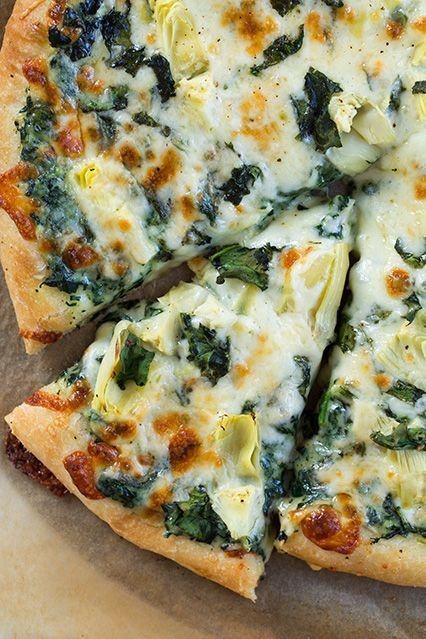
Ingredients
- 2 baby artichokes
- 3 slices quality prosciutto
- 1 small handful olives, stone removed
- ½ cup of spinach
- 50g mozzarella
- Extra virgin olive oil
- Sea salt
- Freshly ground pepper
Recipe Information
In Rome, there are no pizza police as there are in Naples. But if there is a common thread, Roman pizza dough tends to have a thin to medium thin crust.
In many Roman shop fronts pizza is sold by the slice from oiled rectangular sheet pans in which they are cooked. Common toppings of Roman pizza are uncooked crushed tomatoes, fresh sliced mushrooms, dried oregano, garlic, artichoke hearts, prosciutto, hardboiled egg, olives, or anchovies (this is called alla Napoletana, while anchovy pizza is called Romana in Naples). Below is a fresh spinach pizza made in Rome. Spinach is most certainly not a typical topping.
SFINCIONE (SICILIAN PIZZA)
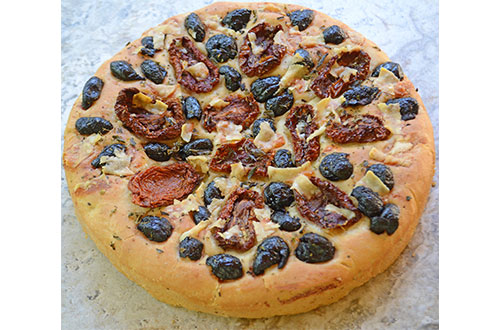
Ingredients
- 2 to 4 anchovy fillets, cut in 1/2-inch pieces
- 1 tablespoon dried oregano leaves
- 10 to 12 sundried tomato halves packed in oil
- 1/4 cup shaved Caciocavallo or Asiago cheese
- Pitted oil cured black olives
Recipe Information
Sicilian pizza, called Sfincione in Sicily may be among the oldest pizza styles. It is characterized by a square or rectangular spongy crust that can be up to 1" thick, often crunchy because the bottom is practically fried in a well-oiled sheet pan. Or more precisely called a focaccia, topped with tomatoes, onions, a few anchovies and perhaps grated casciocavallo cheese, seasoned with a dash of oregano. Outside Italy, the term "Sicilian pizza" is used to describe all kinds of things, but until the 1860s sfincione (loosely translated "thick sponge") was the kind of "pizza" usually consumed in Sicily, especially in the western part of the island.
With a spongy crust up to two centimetres; Typical toppings are products readily available in Sicily: Fresh tomatoes, garlic, oregano, onion, olives, anchovies, and a grated hard cheese, usually pecorino.
For the Crust
Depending on how many pizzas you need take 1 mound per person and make into a large ball. Knead for 5 minutes and separate into the original amount of mounds. Press each mound into shape and follow the method as below.
Method
Lightly press pieces of anchovy into the dough. Sprinkle with oregano. Lightly press tomatoes and olives into dough and arrange cheese on top. Cover with a kitchen towel and let rise until double in size, about 1 hour.
FOCACCIA
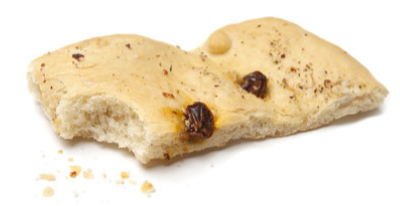
Recipe Information
Focaccia is usually thick, bread like pizza dough. It usually has no sauce but a close brush with olive oil, it should never be greasy, it is usually salty, and often garlicky. Prosciutto, a cured ham, is a common topping. You can get creative here, but keep it simple. There's nothing better than focaccia for mopping up Bolognese sauce or eating alongside a well-stocked charcuterie.
This is a simple focaccia with garlic oil, herbs, sea salt, paprika powder, and smoked cherry tomatoes.
CALZONES AND PANZEROTTI
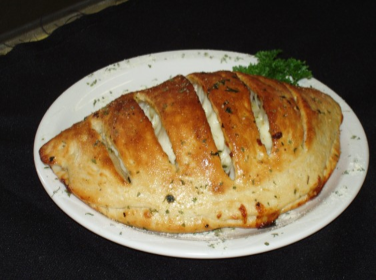
Ingredients
- 150g cherry tomatoes, halved
- 200g buffalo mozzarella, roughly chopped
- ½ cup sliced fresh mushrooms
- ½ cup ricotta cheese
- 1 tablespoon dried basil leaves
- 200g assorted Italian cold meats (for example: salami, pepperoni, prosciutto, speck)
- 1 tablespoon capers, rinsed and drained
- 30g grated parmesan
- Chillies/Jalapeños to taste
Recipe Information
Calzone means 'stocking' in Italian and is a turnover that originates from Italy. Shaped like a semicircle, the calzone is made of dough folded over and filled with the usual pizza ingredients.
Method
It is made by rolling out a round crust, covering half of it with a thick layer of your favourite toppings, folding it over, wetting the edges to help them stick together, crimping them, poking a few holes on top for steam to escape, and then baking.
TURKISH AND ARMENIAN LAHMACUN AND PIDE
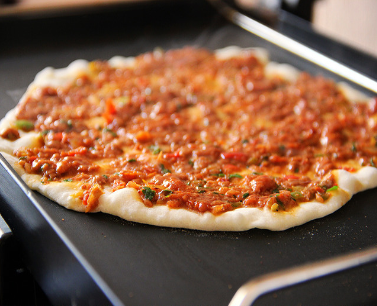
Ingredients
- 500g ground beef
- 1 red paprika
- ½ green paprika
- 2 tomatoes (you can use tinned tomatoes)
- 1 large onion
- 1 teaspoon pepper/tomato puree
- 1½ tsp ground cumin
- 1½ teaspoon ground black pepper
- 3 teaspoon salt
- ½ cup of parsley
- 1/5 cup olive oil
Recipe Information
Although Lahmacun may look somewhat similar to Italian pizza (and is referred to as Turkish pizza outside of Turkey), their tastes are completely different.
Lahmacun is spicy, the dough is very thin, there is no cheese and its main ingredient is the ground meat. Lahmacun is especially famous in the Southern and Eastern parts of Turkey where it's traditionally eaten with salad and lots of red hot pepper flakes!
For the crust
Add a teaspoon of sugar and a tablespoon of yoghurt per mound.
Method
Put the paprika, tomatoes, parsley and onion in a food processor and mix until everything is well ground.
The consistency of the mixture should be in between a paste and sauce.
Add this, together with the tomato puree, olive oil and spices to the ground beef and mix with your hands until everything is mixed thoroughly.
NEW YORK PIZZA

Ingredients
- 500g shredded mozzarella cheese
- ½ cup grated Romano cheese
- ¼ cup chopped fresh basil
- 1 tablespoon dried oregano
Recipe Information
Pizza came to the US with Italian immigrants through New York and it New York pizza is the standard of excellence for thin crusts everywhere. If there is one word to describe the New York pizza, it is "foldable". Or maybe it is "stringy". Or even "greasy". Typically these 18" disks are made from elastic dough with a bready rim, thin centre, dark bottom, stringy cheese, with an orange drop of grease dripping from the delta, and easy to fold so it can be eaten while walking. They are cut into 8 large wedges so it can be sold by the slice.
For the crust
Add a teaspoon of sugar per mound.
Method
Spread the tomato sauce evenly over the dough. Sprinkle with oregano, mozzarella cheese, basil, Romano cheese and red pepper flakes.
Standard toppings are tomato sauce with noticeable oregano and garlic and mozzarella. That's it. Pepperoni is probably the most common extra. Yes, you can get more stuff on top, but the basic pizza you get by the slice in hundreds of pizza joints in Manhattan is just sauce and cheese.
CHICAGO DEEP DISH PAN PIZZA
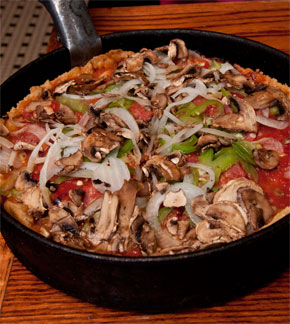
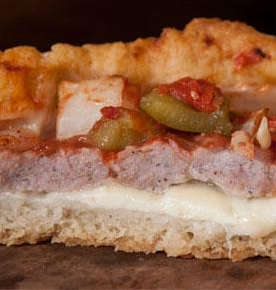
Ingredients
- 340g mozzarella cheese, sliced
- 1450g Italian sweet or hot sausage, cooked and sliced; or about 3 cups of the sautéed vegetables of your choice
- 800g plum tomatoes, lightly crushed; or 800g diced or chopped tomatoes
- 2 to 4 garlic cloves, peeled and minced, optional
- 1 tablespoon sugar, optional
- 1 to 2 teaspoons Pizza Seasoning or mixed dried Italian herbs (oregano, basil, rosemary), to taste
- 1 cup freshly grated Parmesan or Asiago cheese
- 2 tablespoons olive oil, to drizzle on top
Recipe Information
Pizza fans either love or hate Chicago Deep Dish Pan Pizza. The best are made in a cast iron pan, before you put it in your wood fired oven. The crust is about 1/2" thick on the bottom and the dough is pushed up the sides of the pan in order to form a levee to hold in the toppings. From there it is built in layers in the opposite order of a normal pizza.
Method
Cover the bottom of the crust with the sliced mozzarella, fanning it into the crust. Add the sausage (or sautéed vegetables), Drain the tomatoes thoroughly. Combine them with the Pizza Seasoning or herbs, and the garlic and sugar (if you're using them). Add salt to taste; you probably won't need any additional salt if you've used the Pizza Seasoning. Then add this tomato mixture. Sprinkle with the grated Parmesan, and drizzle with the olive oil.
PITA AND GYROS
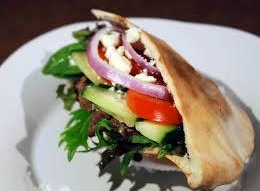
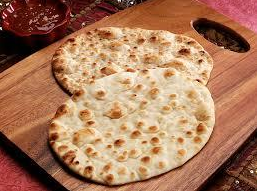
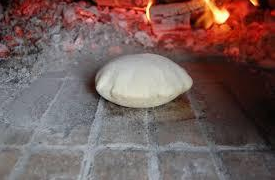
Ingredients
- 1 medium cucumber, peeled, seeded and chopped into chunks
- 1 teaspoon salt, plus more to taste
- 1 cup plain Greek yogurt (I used fat free)
- 1 clove garlic, finely minced
- 1 tablespoon fresh lemon juice
- 1 tablespoon extra virgin olive oil
- 1 tsp red wine vinegar
Recipe Information
There are two different types of pita: The pocket style is often stuffed to make falafel, gyros or other sandwiches. It is made by placing a thin layer of dough in the wood fired oven. Due to the high heat, the dough inflates with air as it cooks so that there are two separate layers when it deflates. They can be seasoned and recooked to create crispy chips. The thicker, single-layer Greek style pita is better for scooping sauces or dips, such as hummus or tzatziki, and is traditionally cooked in a stone floor oven. They can also be cut open to create an envelope, so the pita can be used as a type of sandwich for filling.
If you weigh out your dough into mounds of 100g and roll these into an oval shape and then half it – slide the 2 pieces into the oven and they will make perfect pitta breads. They’ll only need approximately 30-60 seconds on the hot stone of the wood fired pizza oven. They will puff up and once cooled you can cut them open to create an envelope type pocket to fill with your favourite ingredients.
For the Crust
Add a teaspoon of sugar and a tablespoon of yoghurt per mound.
Gyros with Greek Chicken & Tzatziki Sauce
Ingredients
- 1 tablespoon chopped fresh parsley
- 1 tablespoon chopped fresh dill (or 1 teaspoon dried)
- Freshly ground black pepper
- Chicken Soulvaki
- 4 skinless chicken breasts
- ¼ cup extra virgin olive oil, plus more for brushing
- ¼ cup lemon juice
- 3 tablespoon plain Greek yogurt
- 1 tablespoon red wine vinegar
- 1/3 cup chopped red onion
- 2 cloves garlic
- 1½ teaspoon dried oreganom
- 1 teaspoon dried thyme
- ½ teaspoon coriander
- Salt and freshly ground black pepper, to taste
Method
Place diced cucumber in a mesh strainer or colander and sprinkle with salt, toss to evenly coat then allow to rest 30 minutes at room temperature.
Rinse cucumbers and place over several layers of paper towels. Squeeze some of the liquid from cucumbers (almost as if wringing moisture from a cloth). Place cucumbers in food processor and pulse to chop to desired size. Add in Greek yogurt, garlic, lemon juice, olive oil, red wine vinegar, parsley, and dill and season with salt and pepper to taste. Plus to blend (or if you want it chunky you can simply stir the other ingredients in using a bowl and spoon so the cucumbers are chopped up more). Store in refrigerator in an airtight container up to 3 days.
In a mixing bowl, whisk together olive oil, lemon juice, Greek yogurt, red wine vinegar, chopped red onion, garlic, oregano, thyme, coriander and season with salt and freshly ground black pepper to taste. Place chicken in a gallon Ziploc bag, pour marinade over chicken, seal bag while pressing out excess air and transfer to refrigerator to marinate 2 - 4 hours. Remove chicken during the last 30 minutes of marinating to rest at room temperature before grilling (leave in marinade).
Brush grill grates lightly with oil and preheat grill over moderately high heat. Once hot, add chicken and grill until cooked through (internal temperature should register 165 degrees on an instant read thermometer), rotating once halfway through cooking. Remove from grill transfer to plate and brush chicken lightly with olive oil then cover with foil and allow to rest 10 minutes. Dice into strips.
To assemble gyros
Layer chicken in a row along centre of pita, top with lettuce, tomatoes, cucumbers, Kalamata olives, red onion, feta, cilantro and tzatziki sauce.
Wrap and serve.
FLATBREAD CRUST
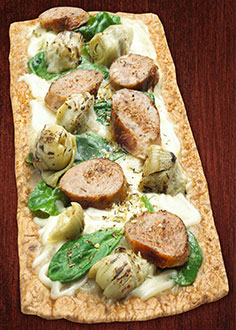
Ingredients
- ¼ cup (4 -5 hearts) marinated artichoke hearts, quartered
- ¼ cup (packed) fresh baby spinach
- 1 link cooked sweet Italian sausage, sliced thin
- ½ cup mozzarella, shredded
- 1 teaspoon Italian seasoning
Recipe Information
Flatbread pizza has seen an uptick in popularity over the past decade or so, as American consumers start to be more health-conscious about the foods they eat. This lighter, thin crust is ideal for appetizers and personal-sized pizzas, because it isn’t as filling as other crust types, and makes health-conscious customers feel less guilty about eating pizza. The artisan look of flatbread crust also makes them an appealing option for gourmet and trendy toppings like balsamic and spinach.
For the Crust
Take 4 x 100g mounds of dough and add 2 finely chopped cloves garlic, 1 tablespoon (3 g) mixed herbs (rosemary and thyme), ¾ teaspoon sea salt, ½ teaspoon cane sugar. Knead the dough to mix with the ingredients and then separate again into 4 even mounds. Roll out into a round shape and cook in the wood fired oven on the hot stone for 30 -60 seconds.
STROMBOLI
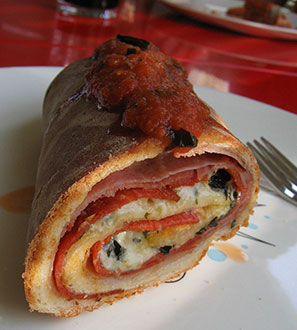
Ingredients
- 2 tablespoons olive oil
- 1 small onion, finely chopped
- 2 cloves garlic, crushed
- 400g can chopped tomatoes
- ½ teaspoon dried oregano
- 1 teaspoon caster sugar
- 8 slices of prosciutto
- 125g mozzarella
- Large handful fresh basil leaves
- Sea salt
- Freshly ground black pepper
Recipe Information
Many people think that Stromboli and Calzones are identical. However, this is not really the case. It’s a bit like a rolled up pizza rather than a folded crust. According to WIKI, "there are several theories regarding the origin of the stromboli. Romano's Italian Restaurant & Pizzeria claims to have originated it in 1950 in Essington, Tinicum Township, just outside of Philadelphia, by Nazzareno Romano. Others claim a stromboli sandwich with chili sauce was invented by Mike Aquino, Sr., in Spokane, Washington, named after the movie Stromboli starring Ingrid Bergman, in 1954."
Method
Heat one tablespoon of the olive oil in a non-stick frying pan and fry the onion over a low heat for five minutes until softened and lightly browned. Stir regularly and add the garlic for the last minute of the cooking time. Tip the tomatoes into the pan and add the oregano and caster sugar. Season with salt and pepper. Place over a fairly high heat and cook the sauce for 5–8 minutes until very thick, stirring constantly. Remove the pan from the heat and leave the sauce to cool.
Roll out the dough on a lightly floured surface into a rectangle measuring about 44cm x 32cm/17in x 13in.
Spread the tomato mixture over the dough, leaving a 2cm border around the edge. Lay the prosciutto in a single layer over the sauce. Tear the mozzarella into small pieces and dot over the prosciutto, then scatter the basil leaves on top.
Tuck in the two short ends and roll the stromboli up firmly to enclose the filling. Place it, seal-side down, on a large baking sheet lined with baking parchment and leave to rise for 30 minutes.
Brush the remaining oil over the dough, season with a little more salt and pepper and bake the stromboli until well risen and golden brown.
Slice thickly and serve with some good olive oil and balsamic vinegar for dipping, and a fresh green salad.
MARINARA
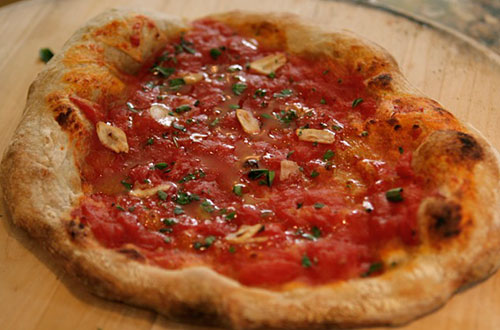
Ingredients
- 1 tablespoon good olive oil
- 1 cup chopped yellow onion (1 onion)
- 1½ teaspoons minced garlic
- ½ cup good red wine, such as Chianti
- 1 can crushed tomatoes, or plum tomatoes in puree, chopped
- 1 tablespoon chopped fresh flat-leaf parsley
- 1½ teaspoons salt
- ½ teaspoon freshly ground black pepper
Recipe Information
The traditional Marinara Pizza has tomatoes crushed, or blended, sliced fresh garlic, fresh oregano, extra virgin olive oil and maybe some sea salt to taste. Some pizzerias may use basil instead, or in addition to the oregano. This pizza not only allows the skill of the pizza maker to come through, but really showcases the quality of the individual.
Method
Heat the olive oil in a large (12-inch) skillet. Add the onion and sauté over medium heat until translucent, 5 to 10 minutes. Add the garlic and cook for 1 more minute. Add the wine and cook on high heat, scraping up all the brown bits in the pan, until almost all the liquid evaporates, about 3 minutes. Stir in the tomatoes, parsley, salt, and pepper. Cover, and simmer on the lowest heat for 15 minutes.
FLAMMKUCHEN
Recipe Information
This pizza originates from South Germany and the Alsace region of France (along the southwestern French-German border). Translated ‘flame cake,’ flammkuchen were originally used by bakers to test the temperature of their ovens. A bit of dough was taken and rolled flat, topped with crème fraîche, and baked in the wood-fired bread oven for a few minutes. The amount of time it took for the flammkuchen to bake to nearly-blistered crispness told them the oven’s temperature. If the flammkuchen came out just right, then the ovens were ready to bake their bread.
CRISPY THIN CRUST PIZZA - Thin and crispy crust pizza lovers, this pizza is for you! Flammkuchen is characterized by its incredibly thin, crisp, and blistered crust. We’re talking cracker-like here folks.
The 2 main differences are that the dough is rolled out using a rolling pin instead of being kneaded with your hands.
And rather than a tomato sauce, the dough is spread with crème fraîche. I recommend mixing the crème fraîche with natural yogurt – a 50/50 mix for the base sauce. When the crème bakes with the crust, it creates a slightly tart, creamy contrast to the crust’s crispness.
BACON AND CARAMELIZED ONION TOPPING
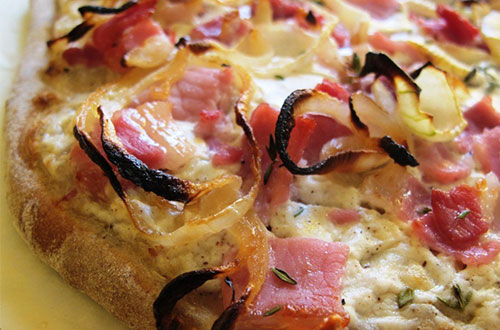
Ingredients
- 12 strips of bacon, cut into small squares or cubes
- 2 onions, finely sliced into rings
- 250g crème fraiche
- 230g natural Greek Yoghurt
- 1 teaspoon nutmeg
- ¾ teaspoon salt
- Freshly ground black pepper
- Freshly grated cheese (I use a combination of cheddar and parmesan and buffalo mozzarella)
- Fresh thyme
Recipe Information
While you can use any toppings that you like for you flammkuchen, the most traditional combination includes bacon and caramelized onions with a bit of nutmeg and black pepper.
Method
On each of the bases, place a few spoonfuls (3-4) creme fraiche/yoghurt mix and spread it around the base with the back of the spoon. Scatter the rest of the ingredients on the top of the yoghurt mix and finish with a sprinkling of cheese.
Salmon and Prawn Topping
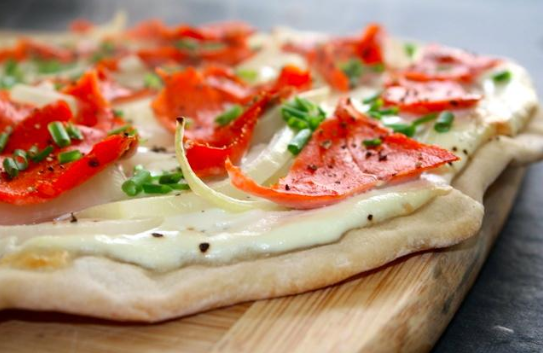
Ingredients
- 250g crème fraiche
- 230g natural Greek Yoghurt
- Smoked salmon and/or prawns
- 3 spring onions per base approximately, chopped very finely
- Freshly grated cheese (I use a combination of cheddar and parmesan and buffalo mozzarella)
Method
On each of the bases, place a few spoonfuls (3-4) crème fraiche/yoghurt mix and spread it around the base with the back of the spoon. Then top with strips of smoked salmon and/or prawns. Sprinkle with the spring onions and the cheese.
Apples and Cinnamon Sugar Tarte Flambée Sucrée
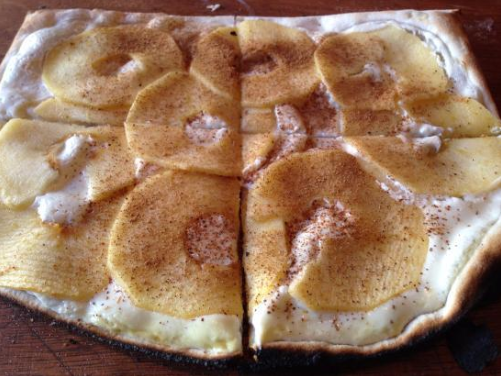
Ingredients
- 2 medium sized Granny Smith Apples, sliced very thinly (I left the peel on)
- 250g crème fraiche
- 230g natural Greek Yoghurt
- 2 tablespoon sugar
- ½ teaspoon ground cinnamon
- 1 teaspoon pure vanilla sugar (I use homemade vanilla sugar)
- Some powdered sugar for serving (optional)
Recipe Information
This tarte flambée is delicious as dessert but you could enjoy it on its own, any time of day. The Granny Smith apples used are not too sweet, so this tart has just the right balance of sweetness from the cinnamon sugar and tartness from the apples.
Method
On each of the bases, place a few spoonfuls (3-4) crème fraiche/yoghurt mix and spread it around the base with the back of the spoon.
Half two Granny Smith apples, core and slice very thinly.
Arrange the apples slices in a decorative pattern on top of the crème fraîche.
In a small bowl, whisk the sugar with the cinnamon and then sprinkle the cinnamon sugar evenly over the apple slices.
Bake until the crust of the tart is firm and browned at the edges
Transfer the tart to a wooden board
Dust with a bit of powdered sugar (optional)